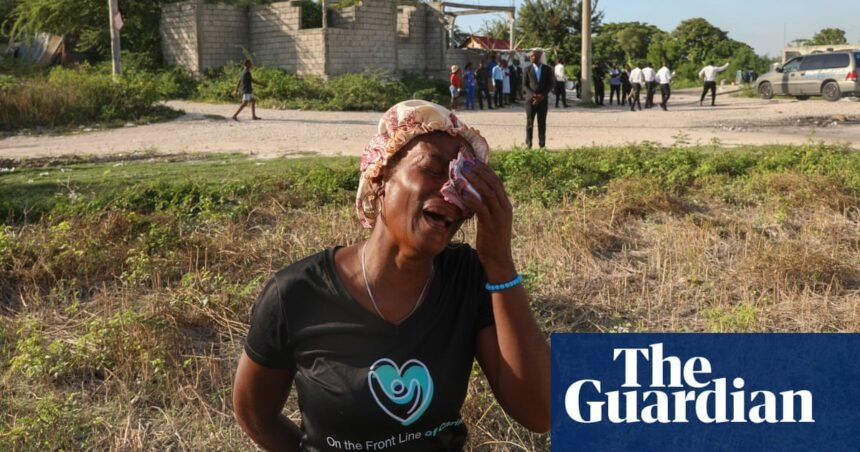The attackers struck under the cover of night, crossing the Artibonite River via an old bridge before rampaging through the once peaceful rural community with automatic weapons and knives. “They were like headless chickens, shooting at anyone they encountered,” recounted Louisseul François, a resident of Pont-Sondé in Haiti, who survived the onslaught.
François heard the initial gunfire around 3 AM, jumped out of bed, and convened with members of a local vigilante group called “the coalition” at the town’s entrance. Despite their efforts to organize, they soon realized they were outgunned and fled into the nearby hills, where terrified locals were hiding. “The gangs shot at anything that moved – even dogs. They aimed to wipe out the whole area. It was a premeditated massacre,” François, 41, lamented, having lost six friends and family members during the early morning attack.
Voice quivering with emotion, François described the horrific scenes he saw upon returning to the area with police, who had pushed the intruders back. The assailants had invaded homes, murdering anyone they found. At one intersection, François spotted four bodies near a house engulfed in flames. Further on, a school and a health clinic had been set ablaze. On one street, 19 corpses lay sprawled on the ground. “Men, women, and a three-year-old child,” the father of three stated.
Those scenes, while terrifying, were just a glimpse of the devastation, with the complete death toll only becoming apparent nearly a week after the violence. At least 115 individuals are believed to have been shot or stabbed to death during the gang’s assault on Pont-Sondé, allegedly in retaliation for the town’s defiance against their control. The victims included both infants and the elderly.
One of the deceased was François’s cousin, whose body – the first he found – lay in a pool of blood. “His head had been shattered by bullets, and his chest was sliced open with a machete,” François shared, having attended three funerals in a single day.
Experts have labeled the October 3rd rampage as one of the most horrific mass killings in Haiti’s history, surpassing the 2018 murder of over 70 civilians in La Saline, Port-au-Prince. “Unfortunately, there are many massacres in Haitian history … But in terms of recent years, this is way up there … It was really unprecedented,” stated William O’Neill, the UN’s top human rights expert in the Caribbean.
O’Neill remarked on the systematic nature of the gang’s actions in Pont-Sondé, describing their extermination campaign as “concerted” and “intentional.” More than merely eliminating lives, he believed the violence was a demonstration of power aimed at Haiti’s recently installed interim government and the UN-backed international security force attempting to restore order amidst the chaos. “Their message was clear – ‘We control this. Don’t mess with us,’” O’Neill said.
When Kenya’s led multinational policing mission first arrived in Haiti in June after a series of upheavals, the country’s new prime minister, Garry Conille, called on gang leaders to drop their guns and acknowledge the state’s authority. Yet, there have been no indications of the gangs complying. Despite some gangs seeming to retreat temporarily, perhaps to assess the foreign presence, most of Haiti remains under gang control, with sporadic violence still occurring, including a deadly assault in Ganthier.
During a visit to Port-au-Prince last month, security expert Romain Le Cour Grandmaison observed that the temporary reduction in violence had created a “precarious peace.”
Nevertheless, the massacre in Pont-Sondé has cast doubt on any recent improvements, highlighting the powerful and politically connected gangs dominating not just the capital but also the vital agricultural region of the Artibonite Valley. “We live in constant fear,” said Myriam Fièvre, the mayor of Saint-Marc, where thousands of displaced Pont-Sondé residents have sought refuge.
The violence has been attributed to one of the most infamous local gangs, Gran Grif, which controls a crucial section of the Route Nationale 1 highway connecting the capital and Cap-Haïtien. A 2023 UN report identified the gang’s main crimes as “murder, rape, robbery, destruction of property, truck hijacking, violence against civilians, and kidnapping.” After announcing sanctions against Gran Grif’s leader, Luckson Elan, the gang perpetrated one of the worst massacres in recent history, demonstrating a blatant display of power and impunity.
Fièvre expressed concern that Port-au-Prince residents may have become desensitized to violence, but the horrors now encroach upon Artibonite, a region not accustomed to such brutality. “The people just want to go about their daily lives … It’s as if we no longer live in our own country,” she said.
O’Neill urged the international community to provide greater support for the underfunded and outmatched multinational security mission in Haiti before the gangs regain control. Currently, the mission has secured roughly £65 million out of the estimated £450 million needed for operations. He compared the mission’s state to a surgeon attempting cardiac surgery without basic medical support.
Two weeks post-massacre, Fièvre indicated that security was slowly returning to Pont-Sondé, thanks to the efforts of Haitian and Kenyan police. However, she lamented the likelihood of gangs attempting to seize control of Saint-Marc, one of Haiti’s largest towns. “We need help, and we need it fast,” she said, “When we sleep now, we feel our fate is in God’s hands.”





